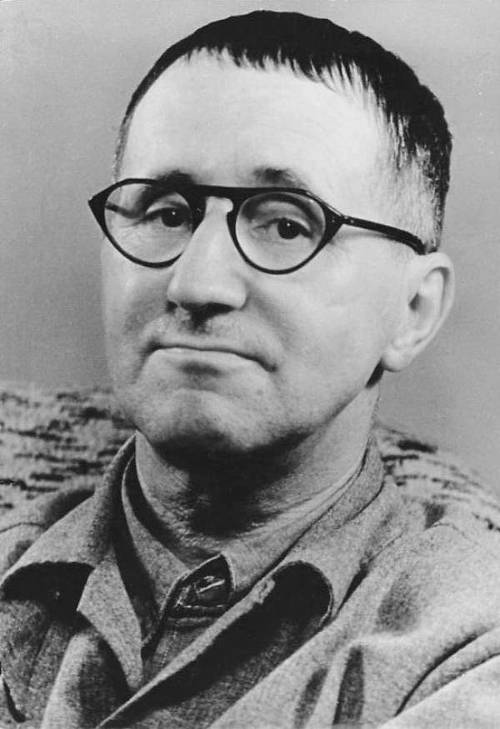
FAQ About Bertolt Brecht

Who was Bertolt Brecht?
Bertolt Brecht was a German playwright, poet, and theatre director, known for his innovative contributions to theatre. Born on February 10, 1898, in Augsburg, Germany, Brecht became a major figure in 20th-century literature and theatre. He is best known for developing the concept of epic theatre, which aims to engage the audience's reason rather than their emotions. Brecht's work often contained political themes and sought to question societal norms.

What is Bertolt Brecht's connection to epic theatre?
Bertolt Brecht is closely associated with the development of epic theatre, a theatrical movement that emerged in the early 20th century. Brecht advocated for a style of theatre that encouraged audiences to view plays critically rather than become emotionally involved in the narrative. Epic theatre uses techniques such as direct address, minimalistic staging, and disruption of the theatrical illusion to provoke thought and reflection on societal issues.

What are some of Bertolt Brecht's most famous works?
Some of Bertolt Brecht's most famous works include "The Threepenny Opera," "Mother Courage and Her Children," "The Good Person of Szechwan," and "The Caucasian Chalk Circle." These plays are renowned for their critical examination of social and political themes and often employ Brecht's epic theatre techniques to challenge audiences.

How did Bertolt Brecht influence theatre and drama?
Bertolt Brecht significantly influenced theatre with his development of epic theatre. He shifted the focus from emotional involvement to critical reflection, encouraging audiences to think about the social and political implications of the play. His use of techniques such as alienation effect, minimalistic staging, and non-linear narratives has left a lasting impact on modern theatre and inspired countless playwrights and directors around the world.

What is the alienation effect in Brecht's theatre?
The alienation effect, also known as "Verfremdungseffekt," is a technique used by Brecht to prevent the audience from becoming emotionally immersed in the theatrical experience. Instead of losing themselves in the story, the audience is encouraged to maintain a critical detachment and recognize the artificial nature of the performance. This is achieved through methods like breaking the fourth wall, unexpected shifts in tone, and the use of direct address.

What themes are commonly found in Bertolt Brecht's plays?
Brecht's plays often explore themes such as social injustice, class struggle, capitalism, war, and human morality. He was deeply concerned with the socio-political climate of his time and used theatre as a tool to critique and analyze these issues. His works encourage audiences to question societal norms and consider alternative perspectives.

Why was Bertolt Brecht considered controversial?
Bertolt Brecht was considered controversial due to his radical political views and the provocative nature of his work. As a committed Marxist, his plays often challenged capitalist ideologies and criticized societal structures. During his lifetime, Brecht faced political persecution, which led him to flee Nazi Germany in 1933. His works were often subjected to censorship and disapproval by conservative audiences and authorities.

How did Bertolt Brecht's political beliefs influence his work?
Brecht's political beliefs, particularly his commitment to Marxism, strongly influenced his work. He used his plays to critique capitalism, social inequality, and the political systems of his time. His aim was to enlighten audiences about societal injustices and inspire them to seek change. This is evident in plays like "The Resistible Rise of Arturo Ui" and "Mother Courage and Her Children," which highlight issues of power, war, and morality.

What is Brecht's significance in modern theatre?
Brecht's significance in modern theatre lies in his innovative approach and the lasting impact of his ideas. He challenged traditional narrative structures and audience engagement techniques, paving the way for contemporary theatre practices. His concepts, such as the alienation effect and epic theatre, continue to influence directors, playwrights, and actors who seek to create socially relevant and thought-provoking works.

Did Bertolt Brecht receive any awards during his lifetime?
Bertolt Brecht received several accolades for his contributions to literature and theatre. Notably, he was awarded the Stalin Peace Prize in 1954 for his artistic achievements. His influence has continued to be recognized posthumously, with numerous institutions and productions celebrating his work around the world.

How did Brecht collaborate with composers like Kurt Weill?
Brecht collaborated with composer Kurt Weill on several projects, most famously "The Threepenny Opera." Their partnership combined Brecht's innovative writing with Weill's unique musical compositions, resulting in works that used music to enhance the narrative and thematic depth. Their collaboration was marked by a focus on satire and social critique.

What impact did Brecht's exile during Nazi rule have on his work?
Exile had a profound impact on Brecht's work and his perspectives. Forced to flee Germany in 1933 due to the rise of the Nazi regime, Brecht spent many years abroad, in places like Denmark, Finland, and the United States. This period of displacement intensified his criticism of fascism and war, themes that are strongly reflected in plays like "Mother Courage and Her Children" and "The Caucasian Chalk Circle." His experiences in exile sharpened his focus on political issues and influenced the development of his epic theatre techniques.

Where did Bertolt Brecht study and begin his career?
Bertolt Brecht began his studies in medicine at Ludwig Maximilian University of Munich but soon shifted his focus to literature and theatre. His involvement with the theatrical scene in Munich, particularly at the Kammerspiele theatre, played a crucial role in shaping his early career. He gained recognition with the success of his play "Drums in the Night," earning the Kleist Prize for young dramatists in 1922.

What is the Brechtian approach to acting?
The Brechtian approach to acting emphasizes the idea of actors maintaining a degree of separation from their characters. This is a direct response to the Stanislavski method, which encourages emotional identification with characters. In Brechtian theatre, actors are expected to present rather than become their characters, using techniques such as direct address, demonstrating actions, and making socio-political commentary to engage the audience critically rather than emotionally.

How did Brecht's work reflect the socio-political context of his time?
Brecht's work was deeply reflective of the socio-political issues of the early to mid-20th century. Living through two world wars, the rise of fascism, and significant social upheaval, Brecht's plays often addressed themes of war, power, oppression, and societal inequality. He used his works to comment on these issues, advocating for social change and highlighting the struggles of the marginalized.

Did Bertolt Brecht face censorship for his works?
Yes, Bertolt Brecht faced censorship at various points in his career, especially due to his politically charged works and Marxist beliefs. During the Nazi regime, his works were banned in Germany, prompting his exile. Even after his return to East Germany post-World War II, some of his plays faced scrutiny from both Western and Eastern authorities who viewed his messages as controversial or subversive.

How is music used in Brecht's plays?
Music in Brecht's plays serves multiple purposes beyond entertainment. It is used to interrupt the narrative, provide commentary, and highlight the socio-political themes of the play. Brecht often collaborated with composers such as Kurt Weill to create songs that juxtapose cheerful melodies with thought-provoking lyrics, reinforcing the alienation effect and encouraging the audience to reflect on the unfolding drama critically.

What influence did Brecht's personal life have on his work?
Brecht's personal life, including his political beliefs and experiences of war and exile, deeply influenced his work. His relationships with influential artists and thinkers of his time, such as Helene Weigel and Karl Korsch, also shaped his viewpoints and creative output. Personal experiences, like his exile from Nazi Germany and exposure to different cultures and political systems, further informed his plays' themes and his development of epic theatre techniques.

What were the main objectives of Brecht's theatre?
Brecht's theatre aimed to provoke rational self-reflection and societal change. He wanted his audience to remain critically detached and continually question the socio-political realities portrayed in his plays. By doing so, he hoped to inspire them to work towards societal improvement and justice. Brecht's theatre sought not just to entertain but to educate and empower audiences to think critically about the world around them.

How did Brecht's theories influence modern film and media?
Brecht's theories, particularly the concept of the alienation effect, have influenced modern film and media by encouraging creators to engage audiences critically rather than emotively. Techniques such as breaking the fourth wall, using non-linear storytelling, and blending different media forms have become common in film and television, inspiring directors like Jean-Luc Godard and Alejandro Gonzales Iñárritu. These methods are used to provoke audience thought and highlight underlying societal issues, reflecting Brecht's enduring impact on narrative arts.
